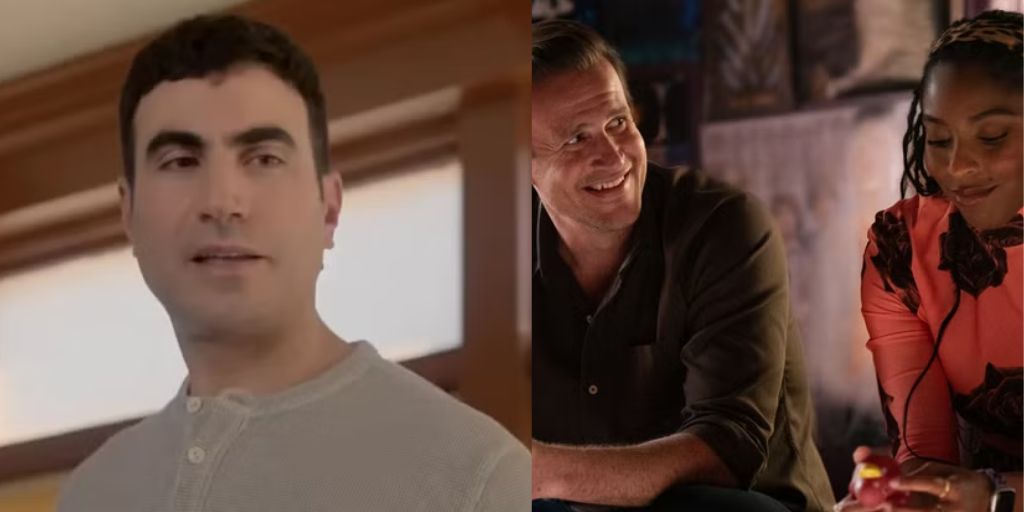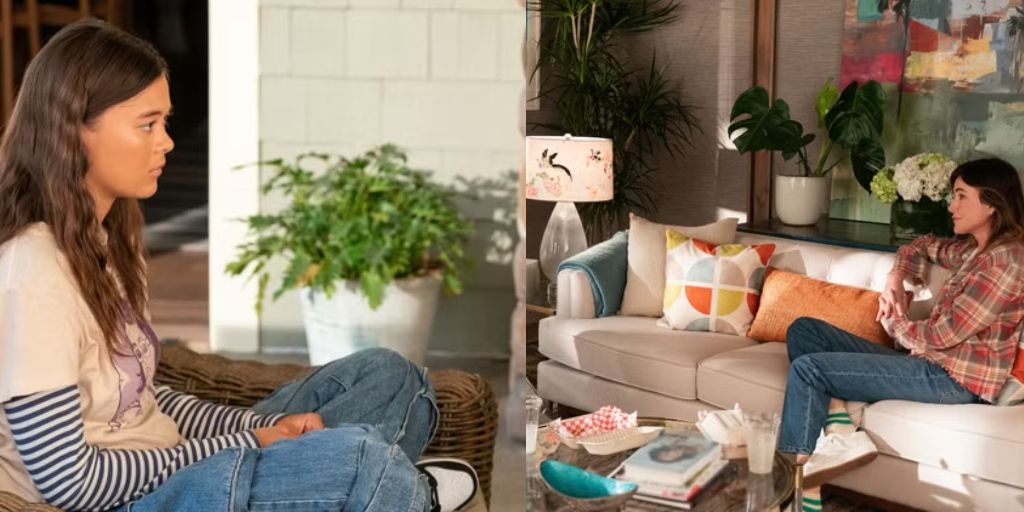Bill Lawrence’s feel-good therapy sitcom Shrinking is back for its second season and doesn’t miss a step. The show picks up from the intense cliffhanger of Season 1, where one of Jimmy’s (played by Jason Segel) patients, Grace (played by Heidi Gardner), was involved in criminal activities.
Season 2 starts by showing the aftermath of these events, as Jimmy begins to come to terms with his actions. This season focuses on Jimmy’s journey to make amends, but it also puts the spotlight on several other key characters, highlighting their own struggles and growth.
In Season 1, Jimmy was in a difficult place, dealing with the loss of his wife and some questionable life choices. But as Season 2 opens, we see him trying to pull himself together, although not without pulling his friends along for the ride.
His friend Brian (Michael Urie) and his boss Paul (Harrison Ford) find themselves involved in Jimmy’s efforts to repair the damage caused in the previous season. Jimmy may be making progress, but the other characters around him, including Alice (Lukita Maxwell), Sean (Luke Tennie), Liz (Christa Miller), and Gaby (Jessica Williams), are all facing significant personal challenges.
The Ripple Effect: How Grace’s Story Drives Season 2
At the end of the first season, viewers were left in suspense after Grace committed a serious crime, sending shockwaves through Jimmy’s life.
This pivotal moment has a major impact on the second season, as Jimmy grapples with the consequences of what happened. Grace’s actions serve as a turning point for Jimmy, forcing him to reevaluate his approach to therapy, his relationships, and his own healing process.
As Jimmy confronts his mistakes, he begins to involve his close friends, such as Brian and Paul, in his journey. Their involvement is not just supportive but also serves to show how interconnected everyone’s lives have become.
Jimmy’s friends are dragged into his personal and professional issues, illustrating how actions in therapy can extend beyond the therapist-patient relationship and affect everyone involved. This season places a heavy emphasis on reconciliation and making up for past mistakes, all while keeping the light, humorous tone the show is known for.
Shifting Focus: New Challenges for Alice, Sean, and Others
While Jimmy is at the center of the story, Season 2 spends more time going into the challenges faced by the other characters. Alice, Jimmy’s daughter, played by Lukita Maxwell, is a prime example.
In Season 1, Alice had to grow up fast after the death of her mother, Tia (Lilan Bowden), taking on the emotional burden of helping her father. She seemed mature for her age, thanks to Paul’s casual therapy sessions, but underneath, she was still grappling with loss and trying to figure out her place in the world.
In Season 2, Alice faces more complicated issues related to friendship and forgiveness. Her storyline centers around learning the importance of real friendships and how to forgive both herself and others. Lukita Maxwell’s performance really shines this season, as Alice’s character development is deeper and more nuanced.
Maxwell holds her own in scenes with veteran actors like Christa Miller and Harrison Ford, showing growth and maturity that resonate with younger viewers who may be facing similar issues in their lives.
Sean (Luke Tennie), who was one of Jimmy’s patients in the first season, also finds himself facing new problems in Season 2. Sean’s character arc is emotionally rich, and Tennie brings a subtle but powerful performance to the role.
While Sean goes through some of the most difficult experiences this season, his character remains a steady, reliable figure who never truly moves forward from the trauma he endured in the previous season. This stalling in his journey reflects the complexity of mental health recovery, showing that not everyone progresses at the same pace.
Brian and Derek: Surprising Growth and Unexpected Struggles
Brian (Michael Urie) also takes on a more significant role in this season. In Season 1, Brian appeared to have everything figured out. He was successful, and confident, and rarely faced any real challenges. However, Season 2 throws him into situations that push him out of his comfort zone.

Brian, who is usually the smartest person in the room, starts to encounter problems he can’t easily solve. This change makes his character more relatable and adds a refreshing layer of complexity to his personality.
One of the biggest surprises this season is Derek (Ted McGinley), Liz’s husband, who was mostly a background character in Season 1. Derek’s comedic timing and easy-going nature made him a likable character, but Season 2 takes his character in a different direction.
His relationships are tested in unexpected ways, forcing him to deal with emotions and situations he’s not prepared for.
McGinley’s portrayal of Derek remains a standout, and the writers have found a way to balance his comedic role with more serious, heartfelt moments. Derek’s journey adds emotional weight to the series while maintaining the humor that keeps audiences engaged.
The Importance of Therapy in Shrinking: More Than Just a Punchline
A major theme of Shrinking is the role of therapy in dealing with life’s difficulties. Season 2 continues to stress the importance of discussing mental health openly and seeking help when needed.
Whether it’s Jimmy trying to fix his wrongs, Alice figuring out her relationships, or Sean struggling with his trauma, therapy is a crucial part of their healing process. The show makes a strong case for mental health care, not as a quick fix, but as a long-term journey.
This season does an excellent job of highlighting how therapy is not just about addressing big issues like grief and trauma, but also smaller, everyday problems like reconnecting with a parent or showing friendship dynamics. The characters are constantly reminded that it’s okay to not have everything figured out, and that seeking help is a sign of strength, not weakness.
Brett Goldstein’s Impact: Emotional Depth and Strong Performances
One of the most notable additions to Season 2 is Brett Goldstein, who plays a pivotal character. Goldstein, who gained widespread recognition for his role as Roy Kent in Ted Lasso, brings a unique blend of emotional depth and subtle humor to Shrinking.
While his character is very different from the gruff footballer he played in Ted Lasso, Goldstein’s ability to convey vulnerability through his performance stands out in this season.
Although Goldstein’s screen time is somewhat limited, his presence in the series adds an important emotional layer.
His interactions with the other characters bring out some of the most poignant moments of the season, making his absence noticeable whenever the show shifts focus to other storylines. His ability to connect with the cast and elicit strong emotions helps upgrade the emotional stakes of Season 2.
A Balance of Comedy and Catharsis: Shrinking’s Unique Approach
One of the reasons Shrinking resonates with viewers is its ability to balance humor with emotional depth. The show deals with serious topics like grief, trauma, and forgiveness, but it does so in a way that feels light and approachable. The witty banter between the characters keeps the mood upbeat, even when the storylines get heavy.
In Season 2, the comedy is as sharp as ever, but there’s a greater emphasis on the cathartic moments. Watching the characters confront their problems head-on provides a sense of relief for both the characters and the audience.
The show doesn’t shy away from uncomfortable conversations, and that’s part of what makes it so relatable. The characters are messy, flawed, and human, and seeing them break down and rebuild themselves is what makes Shrinking stand out from other comedies.
Challenges with Pacing: Some Stories Resolve Too Quickly
While Shrinking Season 2 is full of strong emotional beats and well-timed humor, it does have some pacing issues. In some cases, the characters’ problems are resolved too quickly.
One of the strengths of the show is watching the characters struggle with their issues and eventually overcome them, but when the resolutions happen too fast, it can feel a bit unearned.
For example, certain conflicts are introduced and then wrapped up within the same episode, leaving viewers wanting more time to see the characters truly grapple with their challenges.
The show shines brightest when it allows the characters to sit in their discomfort and slowly work through their problems. When the resolutions come too easily, it takes away from the full impact of their journeys.
Sean’s Stagnant Growth: A Missed Opportunity
Another issue with Season 2 is that some characters, like Sean, don’t experience as much growth as others. While Sean goes through some of the most intense experiences of the season, his character doesn’t seem to evolve much from where he was in Season 1. This lack of progress can be frustrating for viewers who are invested in his story and want to see him move forward.
Sean’s journey in Season 2 feels more like a continuation of his Season 1 storyline rather than a new chapter. While it’s understandable that not every character will experience significant growth each season, it would have been nice to see Sean take more steps toward healing and self-discovery.
Realistic Portrayal of Mental Health: Progress Is Not Always Linear
Despite these pacing issues, Shrinking does a great job of portraying mental health in a realistic way. The show reminds viewers that progress is not always linear, and healing takes time.
Some characters, like Jimmy and Alice, make great strides in their personal growth, while others, like Sean, remain stuck in their struggles. This mirrors real life, where some people are able to overcome their challenges more quickly than others.
Shrinking shows that mental health journeys are different for everyone, and there’s no one-size-fits-all solution. Each character deals with their issues in their own way and at their own pace, and the show doesn’t rush their progress.
This realistic portrayal of mental health is one of the show’s greatest strengths, as it encourages viewers to be patient with themselves and others as they show their own struggles.
Conclusion: Shrinking Season 2 Delivers More Heartfelt Moments and Laughter
Shrinking Season 2 builds on the strong foundation of the first season, offering viewers a mix of heartfelt moments, sharp comedy, and relatable character growth. While the pacing may feel rushed at times, the emotional depth and humor more than make up for it.

The characters’ journeys, especially Jimmy’s, Alice’s, and Brian’s, are rich and engaging, and Brett Goldstein’s addition to the cast brings a new layer of emotional complexity to the series.
For fans of the first season, Season 2 offers more of what made the show a hit: a lighthearted but meaningful look at therapy, mental health, and the messiness of life.
Shrinking continues to remind us that it’s okay to be vulnerable and that healing, while difficult, is always possible. The show is a warm, funny, and touching portrayal of what it means to be human.





